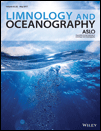
LIMNOLOGY AND OCEANOGRAPHY
metrics 2024
Illuminating Freshwater and Marine Dynamics
Introduction
Limnology and Oceanography is a premier peer-reviewed journal published by Wiley that has been at the forefront of aquatic sciences since its inception in 1956. With an impressive impact factor placing it in Q1 in both Aquatic Science and Oceanography categories, this journal showcases cutting-edge research and studies relevant to the dynamics of freshwater and marine ecosystems. Limnology and Oceanography serves as a vital platform for researchers, professionals, and students to disseminate their findings and foster a deeper understanding of aquatic environments. The journal does not currently offer open access, but it provides a unique opportunity for scholars to contribute to a body of work that influences policy, conservation efforts, and the scientific community at large. With its substantial ranking in Scopus as #12 in Aquatic Science and #9 in Oceanography, Limnology and Oceanography remains a critical resource for advancing knowledge in these vital fields.
Metrics 2024
 1.59
1.59 3.80
3.80 4.40
4.40 223
223Metrics History
Rank 2024
Scopus
IF (Web Of Science)
JCI (Web Of Science)
Quartile History
Similar Journals
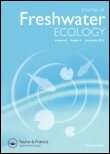
JOURNAL OF FRESHWATER ECOLOGY
Unveiling the mysteries of freshwater biodiversity.JOURNAL OF FRESHWATER ECOLOGY, published by Taylor & Francis Inc, is an esteemed source of research dedicated to advancing the understanding of freshwater ecosystems. Established in 1981, this Open Access journal has provided a platform for innovative studies and groundbreaking articles relevant to the fields of Aquatic Science and Ecology. With its HIndex reflecting a commitment to quality scholarship, the journal is currently classified in the Q3 category for both Aquatic Science and Ecology, Evolution, Behavior and Systematics, indicating its respectable impact within these disciplines. The journal ranks within the 45th percentile in Ecology and the 41st percentile in Aquatic Science on Scopus, highlighting its relevance to a global audience of researchers and practitioners. By facilitating unrestricted access to research findings since 2017, JOURNAL OF FRESHWATER ECOLOGY aims to enrich our understanding of freshwater systems and their conservation, making it an essential resource for those invested in ecological research and environmental sustainability.
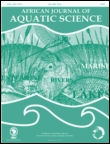
AFRICAN JOURNAL OF AQUATIC SCIENCE
Exploring the depths of biodiversity and conservation.AFRICAN JOURNAL OF AQUATIC SCIENCE, published by TAYLOR & FRANCIS LTD, is a premier scholarly journal dedicated to the field of aquatic science, ecology, and environmental management, playing a crucial role in advancing research and knowledge in these vital areas. With an impressive Q2 ranking in both Aquatic Science and Ecology, Evolution, Behavior and Systematics, the journal seeks to publish high-quality research encompassing a wide range of topics related to freshwater and marine ecosystems, including biodiversity, conservation strategies, and the impacts of climate change. Featuring a rich history of publication from 2000 to 2024, the journal not only embraces rigorous peer review but also aims to foster collaboration and dialogue among researchers, practitioners, and students interested in aquatic environments. Readers will find that the journal’s commitment to impactful scientific communication is reflected in its notable rankings within the Scopus database, making it an essential resource for those engaged in aquatic research and management.
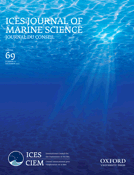
ICES JOURNAL OF MARINE SCIENCE
Pioneering Research in Marine Science Since 1903The ICES Journal of Marine Science, published by Oxford University Press, stands at the forefront of marine research, offering cutting-edge insights into aquatic sciences and oceanography since its inception in 1903. With its ISSN 1054-3139 and E-ISSN 1095-9289, this esteemed journal has garnered a reputation for excellence, evidenced by its Q1 rankings in categories such as Aquatic Science, Ecology, and Oceanography as of 2023. The journal's commitment to advancing knowledge in marine systems makes it an essential resource for researchers, professionals, and students alike, who are keen to explore the intricate ecosystems that sustain our planet. Without an open access model, the journal maintains a rigorous editorial standard and is recognized among the top journals, ranking impressively in various Scopus categories. Authored contributions reflect pioneering research that informs policy and fosters sustainable practices, making this journal a critical platform for disseminating marine science knowledge.

ECOLOGICAL RESEARCH
Bridging knowledge and action for a thriving planet.ECOLOGICAL RESEARCH is a prestigious academic journal published by WILEY, dedicated to advancing the field of ecology and its associated disciplines. Since its inception in 1986, the journal has consistently provided a platform for high-quality, peer-reviewed research, contributing significantly to the understanding of ecological systems and their complexities. With an impressive 2023 impact factor reflected in its Q1 ranking in the category of Ecology, Evolution, Behavior, and Systematics, it stands among the top journals in its field, as evidenced by its Scopus rank of #192 out of 721 and placement in the 73rd percentile. While accessible through standard subscription models, this journal plays an essential role in disseminating crucial findings and innovative methodologies to researchers, professionals, and students alike. With a commitment to fostering ecological knowledge and collaboration, ECOLOGICAL RESEARCH continues to influence ecological practices and policies, shaping the future of research in this critical area.

Biogeosciences
Empowering researchers with open access to vital biogeoscience insights.Biogeosciences, published by COPERNICUS GESELLSCHAFT MBH in Germany, is a prestigious open access journal that has been a leading platform for innovative research since its establishment in 2004. With an impressive impact reflected in its Q1 rankings within both the Earth-Surface Processes and Ecology, Evolution, Behavior and Systematics categories, it caters to a diverse readership encompassing researchers, professionals, and students engaged in the life sciences and earth sciences. The journal's commitment to disseminating high-quality research is evident from its exemplary Scopus rankings, highlighting its role in fostering advancements and discussions in biogeoscience. With full open access options, readers worldwide can freely explore significant findings that contribute to our understanding of ecological and geoscientific principles. As the journal converges into its next decade, it continues to be an essential resource for those seeking to bridge the disciplines of biology and earth sciences.
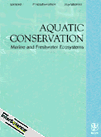
AQUATIC CONSERVATION-MARINE AND FRESHWATER ECOSYSTEMS
Driving impactful research for aquatic sustainability.AQUATIC CONSERVATION-MARINE AND FRESHWATER ECOSYSTEMS, published by WILEY, is a premier international journal dedicated to advancing the understanding of aquatic ecosystems and their conservation. With an impact factor reflecting its significant influence and a distinguished position in the Q1 quartile across key categories such as Aquatic Science, Ecology, and Nature and Landscape Conservation, this journal serves as an essential resource for researchers and professionals engaged in the study and protection of marine and freshwater environments. Covering a broad array of topics, from ecosystem management to conservation strategies, the journal encourages the dissemination of innovative research and interdisciplinary perspectives. Although it is not an open-access publication, this journal is esteemed for its rigorous peer-review process, facilitating a platform where vital research influences policy and practice in the aquatic sciences. Established in 1991, AQUATIC CONSERVATION continues to be a cornerstone in the academic exploration and safeguarding of aquatic ecosystems through to its converged years of 2024 and beyond, providing a critical lens for the future of environmental sustainability.

International Journal of Limnology
Unveiling the Mysteries of LimnologyThe International Journal of Limnology, published by EDP SCIENCES S A, is a cutting-edge journal dedicated to the field of aquatic sciences, with a strong emphasis on limnology—the study of inland waters. Headquartered in France, the journal serves as a vital resource for scholars and practitioners alike, aiming to advance the understanding of freshwater ecosystems and their management. With an e-ISSN of 2823-1465 and classified within the Q3 category of the 2023 Aquatic Science quartiles, it occupies a significant niche in academic research, ranking 150 out of 247 in Scopus listings. The journal’s open access policy ensures that research findings are widely disseminated, facilitating collaboration and innovation across global aquatic science communities. Published continuously from 2022 to 2024, the International Journal of Limnology aspires to contribute to sustainable practices and enhance ecological understanding, making it an essential publication for researchers, professionals, and students committed to the stewardship of aquatic resources.
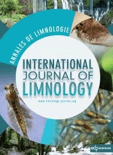
ANNALES DE LIMNOLOGIE-INTERNATIONAL JOURNAL OF LIMNOLOGY
Championing Open Access to Aquatic ResearchANNALES DE LIMNOLOGIE-INTERNATIONAL JOURNAL OF LIMNOLOGY is a distinguished scientific journal dedicated to the field of limnology, focusing on freshwater ecosystems and their ecological dynamics. Published by EDP SCIENCES S A, this journal has been a vital resource for researchers and professionals since 1965, fostering a deep understanding of aquatic environments through quality research and scholarly discussions. The journal was indexed in Scopus, where it ranked in the 37th percentile within the Agricultural and Biological Sciences category, emphasizing its contribution to aquatic science. While its coverage has been discontinued in Scopus since 2021, the journal continues to engage its readership with critical insights and reviews in limnology. ANNALES DE LIMNOLOGIE promotes open access to facilitate the dissemination of valuable knowledge, making it an essential platform for students, researchers, and professionals who strive to advance our understanding of freshwater systems.

Limnology and Oceanography Letters
Connecting researchers to the pulse of aquatic science.Limnology and Oceanography Letters, published by WILEY, is an esteemed peer-reviewed journal dedicated to advancing our understanding of freshwater and marine systems. With an impressive Q1 ranking in both Aquatic Science and Oceanography, this journal has established itself as a pivotal resource for researchers, professionals, and students alike. Since its inception as an Open Access journal in 2016, it has provided unrestricted access to high-quality, innovative research articles that illuminate diverse aspects of aquatic ecosystems and their dynamics. With a publication history from 2016 to 2024 and a significant presence in Scopus rankings—placing it in the top 6% for Oceanography and the top 8% for Aquatic Science, this journal not only fosters scholarly communication but also encourages interdisciplinary collaboration. Addressing pressing issues related to water resource management, climate impact, and ecological integrity, Limnology and Oceanography Letters remains essential for those dedicated to the science of aquatic environments.

Water Biology and Security
Elevating research to protect our vital water ecosystems.Water Biology and Security, published by KEAI PUBLISHING LTD, is a pivotal open-access journal that has been addressing critical issues in the interdisciplinary fields of water sciences, aquatic biology, and environmental sustainability since its inception in 2022. With an E-ISSN of 2772-7351 and a distinguished ranking within the top quartile (Q1) of several categories including Agricultural and Biological Sciences, Animal Science and Zoology, Aquatic Science, and Water Science and Technology, the journal stands out as a leading platform for innovative research. Based in Beijing, China, and supported by an impressive impact factor derived from its Scopus rankings, the journal aims to disseminate high-quality and impactful research that addresses the challenges related to water resources and ecosystems. Its open-access format enhances accessibility, ensuring that vital information reaches policymakers, practitioners, and scholars worldwide. As we converge through 2024, the journal aspires to foster a vibrant scholarly community, facilitating dialogues that inform practice and advance the scientific understanding of aquatic environments.